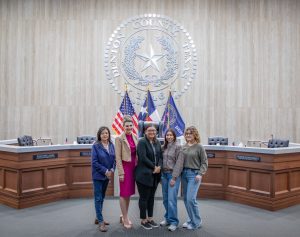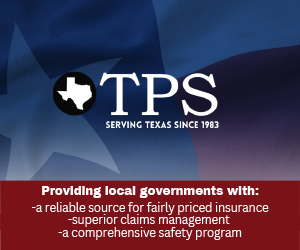A countywide needs assessment conducted last year by United Way of Denton County yielded a startling fact: One in five people experience a mental health crisis each year. In a county with more than 1 million residents and growing by 86 people per day, developing mental health resources became top priority.
A cross-organizational Denton County Behavioral Health Leadership Team spearheaded by United Way of Denton County identified several programs to address not only the need, but also the lack of available resources. A priority was the creation of a mental health navigator program to help individuals navigate the mental health system – a challenging endeavor, especially during a time of need.
DCPH Links was launched by the Denton County Commissioners Court in August 2023, using some $176,000 in funds from the American Rescue Plan Act.
Nestled under the direction of Denton County Public Health (DCPH), the program, DCPH Links Mental Health Navigation, or DCPH Links, was designed to link residents to mental health resources and support as well as monitor where shortages of care exist and determine if individuals received the help they sought.
Photo above: The team behind DCPH Links includes, from left: Isabel Rodriguez, supervisor; Alexandra Reed, division manager – community health; Magdalena Banda, program supervisor; April Hernandez, navigator; and Rachel Herrera, navigator.
A team of four, including two supervisors and two mental health navigators, now answer calls and texts from 9 a.m. to noon and 1 p.m. to 5 p.m. on weekdays. For accessibility, individuals can call or text “LINKS” to 940-349-3000 to reach the navigators or fill out a form online at dentoncounty.gov/links.
The service is provided free of charge, meeting needs identified in the 2023 survey that showed 56 percent of Denton County residents citing costs as being a barrier to mental health care and 30.5 percent noting a lack of available information.
Launched in August 2023, the program was designed as a warm handoff to ensure all those seeking help connect with the level and type of support they desire. Navigators follow up with everyone to see how the connection to the provider or care is going. To date, the program has served 64 individuals. Of those, an estimated 40 percent indicated DCPH Links was the first time they reached out for emotional or mental health support.
“Just in the last few months, we have seen how much this program has impacted individuals in our county,” shared Rachel Herrera, one of two mental health navigators. “Hearing the relief in our community members’ voices when they get connected to the right resources shows us how necessary this work is.”
In the past five months, DCPH Links has collected nearly 400 community resources from counseling and psychiatry practices as well as therapy and support groups to online resources, mobile apps, and inpatient and outpatient services.
“Our hope is to continue reaching community members far and wide, especially those who feel they’re out of options,” Herrara emphasized. “We hope to foster a sense of belonging in our county so that each individual that reaches out knows that he or she is not alone. Including those reading this!”
Navigators with DCPH Links also encourage individuals in immediate crises to contact 988 or a local mental health authority crisis line.
The goal of DCPH Links is to reduce barriers for anyone seeking mental health assistance and to reduce any perceived stigma. Using text options and providing bilingual staff assistance has proven to eliminate several barriers.
“Our mission with this program is simple: Help those in need where they need it and how they need it,” noted Denton County Commissioner Bobbie J. Mitchell, who serves on the Denton County Behavioral Health Leadership Team. “We identified an issue, and we addressed it quickly using some of the federal funds available to us during the recent pandemic.”
April Hernandez, also a navigator, shared her hopes for the program’s future: “My future hope for the program is for us to continue connecting with and supporting our help seekers while bridging the gap between underinsured individuals who struggle to find affordable services. I want us to continue being a safe space for first-time help seekers who reach out and confide in us about their struggles and the kind of treatment they are looking for.
“We are aware of the stigma regarding mental health in the Hispanic/Latino community, and I am proud to say that our team has worked with many of our Spanish-speaking help seekers, helping to guide them and connect them to available resources,” Hernandez continued.
Denton County Judge Andy Eads believes DCPH Links is the first step in ongoing initiatives to address mental health in Denton County.
“We need to be forward-thinking in our decision-making to not only provide the connections for people seeking help, but also to attract the relevant resources as our county continues to grow,” Eads shared.
Denton County also recently partnered with United Way of Denton County to launch CredibleMind, an online source that individuals can use to find out more information about mental health challenges, discover ways to help, and even take an online assessment. This resource supplements DCPH Links as another tool for individuals seeking assistance.
For additional information on the DCPH Links program, email PublicHealth@dentoncounty.gov. – Alexandra Reed contributed to this report.















